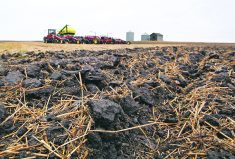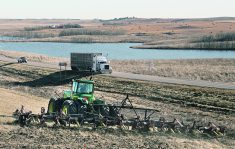Last week, I called the plan proposed by Ottawa to reduce agricultural greenhouse gas (GHG) emissions by 30 percent by 2030 “reckless and not serious”, despite having spent much of my career as a scientist trying to reduce our dependence on synthetic nitrogen fertilizer.
In my opinion, the federal plan respects neither farmers nor the planet.
Since they were first elected in 2015, the federal Liberals have done little on climate change. Now to achieve their 2030 target, Ottawa is asking farmers to make changes rapidly, and yet they have offered shockingly little cash, $200 million, to do so.
Read Also

Kochia has become a significant problem for Prairie farmers
As you travel through southern Saskatchewan and Alberta, particularly in areas challenged by dry growing conditions, the magnitude of the kochia problem is easy to see.
Canada has 90 million acres of farmland. That works out to $2 per acre, distributed through various third-party organizations. It’s a gut punch to offer a measly $200 to a 100-acre Ontario corn farmer to mess around with something as critical as nitrogen.
The feds’ plan focuses on reducing nitrous oxide emissions, often associated with loss of excess nitrogen not absorbed by plants.
The problem is that most nitrous oxide reduction strategies have a cost, and furthermore several only become profitable if a farmer reduces his fertilizer rates — that’s what offsets the cost. The feds may provide assurances that they’re not forcing farmers to reduce fertilizer rates, which is good, but it’s built in.
Farmers can reduce nitrogen fertilizer rates without yield declines with good strategies, but every farm and season are different, and risk is involved.
This requires incentives including significant cash to reimburse farmers for these costs and to back-stop any resulting yield declines. This is especially important because Canada’s proposed plan lacks an American-style environmental credit system, which rewards farmers with direct payments for helping the planet.
What’s the solution?
I suggest $3 billion in direct payments to farmers in 2022-23. This would enable farmers to be reimbursed up to $30 per acre, multiplied by their total acreage. A 330-acre farm could get up to $10,000 to experiment with GHG reduction strategies out of a targeted list created by experts. And wiggle room for farmers to test their own innovations.
Under this proposed new plan, farmers would need to submit receipts for climate friendly technologies, like nitrification inhibitors, cover crop seeds, soil tests, tile drainage installation, or changes to more environmentally friendly practices.
Ottawa should repeat the program twice until 2033 (so a 330-acre wheat farmer would receive three payments of up to $10,000) for a total investment of $10 billion over 10 years.
A farmer could pay for cover crop seeds for three rotations or try three different strategies, with time in between to measure success.
Critically, if a farmer wanted to experiment on a small portion of their acreage with a new technology or practice and then suffered financial losses, they could get reimbursed.
Most importantly, farmers could use the money to design a customized strategy that has the greatest chance of maximizing their own long-term profits while helping the planet. Without a nitrogen credit direct-pay system, profit becomes the only incentive.
There should be separate funds and solutions for high value/small acreage crops, the greenhouse industry, livestock producers, and other ag sectors. There also needs to be a mechanism to credit farmers who’ve already invested time and labour in climate change innovation, to be fair to them, perhaps using ongoing tax credits or reduced crop insurance premiums.
This is what a serious climate change plan looks like.
If you agree with this plan, now is the time to email or phone your local member of Parliament and MPPs or MLAs. Federal and provincial ministers are meeting in November to decide Canada’s five-year agriculture action plan. Tell them that your future vote depends on them respecting farmers and the future of farming.
Manish N. Raizada is a professor in the Department of Plant Agriculture at the University of Guelph, Ont.





![Protesters crowd a street carrying signs that read, "Global warming real. In other news, water is wet," and "Stop denying the [blue painted pic of the Earth] is dying."](https://static.producer.com/wp-content/uploads/2025/07/29145152/158171_web1_2019-10-18T222818Z_1221762151_RC14C26A65A0_RTRMADP_3_CLIMATE-CHANGE-THUNBERG-1200-220x165.jpg)











